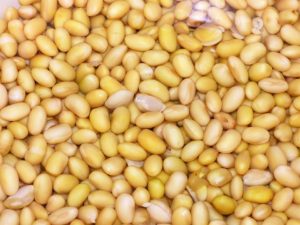Soy and negative effects on health
 1. Soy has little protein content. It contains very little methionine (the only sulpher-bearing essential amino acid).
1. Soy has little protein content. It contains very little methionine (the only sulpher-bearing essential amino acid).
2. Soy lowers testosterone levels. Bad news for men.
3. Soy contains a lot of isoflavones. Isoflavones inhibit the thyroid gland. Bad news for your energy and metabolism.
4. Soy irritates the intestine. Saponins and lectins are the culprits. People with irritable bowel syndrome should stay away from it.
5. Soy is a bean and in its unfermented state can cause flatulence.
6. Unfermented soy contains strong protein inhibitors, substances that inhibit the absorption of protein. Not good for athletes, children and health in general.
7. Unfermented soy contains highly active phytates, substances that prevent calcium, magnesium, iron and zinc being absorbed by the body.
1. Soy contains little of the essential protein methionine
Soy contains little of the essential sulpher-bearing protein methionine and little or no cysteine. Methionine and cysteine are essential for the synthesis of protein in the body. Soy has too little of these amino acids. Wheat and spelt, from which seitan is made, do have sufficient amino acids. Methionine is partly responsible for a healthy, elastic and strong skin, a healthy intestine and strong joints. The sulpher-bearing methionine and cysteine ensure the bonding of elastin and collagen. Cysteine is an amino acid essential for the body to synthesise its own antioxidant glutathione. Seitan delivers up to twice as many amino acids (protein) per Kcal as soy. Seitan from wheat or spelt delivers a complete protein with a sufficient amount of all the essential proteins.
2. Soy lowers testosterone levels
Soy is far richer in plant oestrogens, better known as isoflavones (genistein, daidzein and glycitein). Isoflavone levels peak in the blood 6 to 8 hours after ingestion. Isoflavones have often been reported in the news as having a favourable impact on menopause symptoms. But isoflavones have also been associated with cardiac arrhythmia and brain degeneration because they disrupt hormonal and endocrine systems. It is known that plant oestrogen lowers testosterone levels in men (decreased sexual appetite) and interferes with female fertility.
Japanese women used to give their unfaithful men large portions of tofu. Priests in Zen monasteries suppressed their sexual appetites with tofu. Traditionally fermented soy products contain significantly less isoflavones.
Soy works on the thyroid and affects hormones and irritable bowel syndrome
3. Thyroid problems and soy
Soy can cause thyroid problems. Soy beans contain thyroid hormone inhibitors (goitrogens). An enlarged thyroid causes goitre formation (swelling of the neck). This can result from the combination of isoflavones, saponins and phytates found in soy. Babies and toddlers are especially sensitive to these substances. In countries where large quantities of (non-fermented) soy is consumed, thyroid diseases are more common.
4. Soy and irritable bowel syndrome
Unfermented soy contains lectins, saponins and oxalates. Lectins are sweet-tasting amino acids that are associated with intestinal problems and blood clots.
Saponins taste bitter and soy contains three types of them. Saponins have antimicrobial properties, which is beneficial. However, they also irritate the intestinal wall. In large quantities, or where intestines are weak, saponins cause increased permeability of the intestinal wall, releasing germs more rapidly into the bloodstream.
Oxalates are indigestible substances that bind with calcium. Soy is rich in oxalates. The American Dietetic Association recommends a maximum of 10 mg oxalates per meal for people with kidney stones. Tofu and other soy products contain 16 to 638 mg oxalates per portion.
5. Flatulence from soy
Soy can cause intestinal problems. Fermentation largely prevents flatulence. However, modern soy products are not usually fermented.
Like all types of bean, soy beans supply high levels of oligosaccharides. They often cause poor digestion with bloating and therefore flatulence. Oligosaccharides cannot be fully digested without the digestive enzyme alpha-galactosidase. Fermentation lowers oligosaccharide levels and increases that of alpha-galactosidase, which is why traditionally made and therefore fermented tempeh, natto and miso has little or no detrimental effect on the intestines.
Saponins and lectins in non-fermented soy do irritate the intestines. People with irritable bowel syndrome are, therefore, better off without it.
6. Protein inhibitors in soy
Amino acids can only be digested by protein enzymes, of which trysine is the most important. Like many plants, in its raw state soy contains numerous protein inhibitors. Soy contains at least 5 types of protein inhibitor and these are highly heat-resistant. This means that 13 % of protein inhibitors are still active in modern soy milk. In tofu, this figure is 5 %, in soy sauce 0.8 %, in natto 0.7 % and in miso 0.3 %. Protein inhibitors are associated with pancreatic cancer. Traditional, fermented soy deactivates most of these protein inhibitors. GM soy does not deactivate protein inhibitors.
7. Phytates in tofu and other soy products
Tofu, soy milk and modern soy-based products also contain huge amounts of active phytates. Protein from soy contains 490 to 840 mg of phytates per 100 grams. Soy beans contain three times more phytates than mung beans and four times more than chickpeas. Phytates bind with minerals such as iron, zinc, calcium and magnesium, thereby preventing effective absorption of these minerals by the body.
Rinsing and fermentation reduces the functioning of phytates. Wheat and spelt, both the base ingredients for seitan, are naturally poorer in phytates and the extensive rinsing of seitan ensures that seitan is practically free of this acid.






